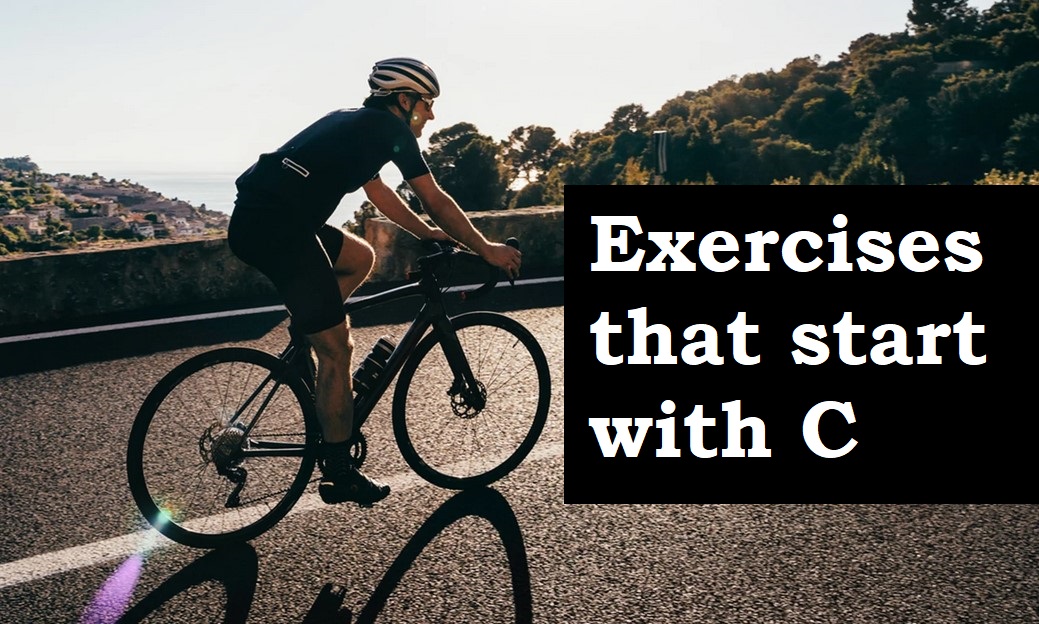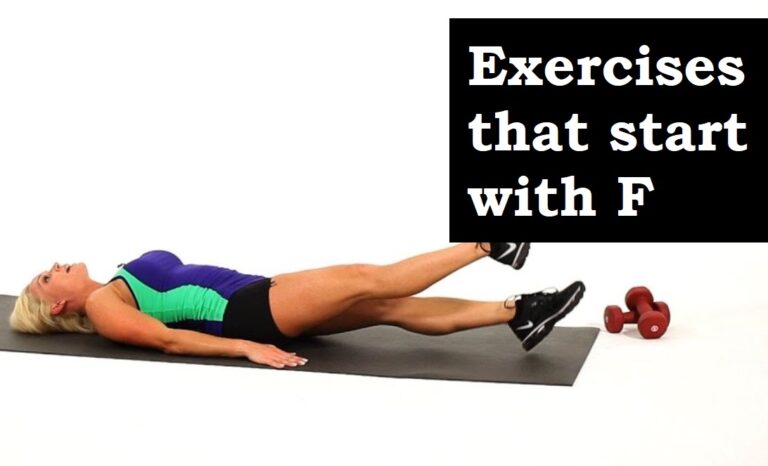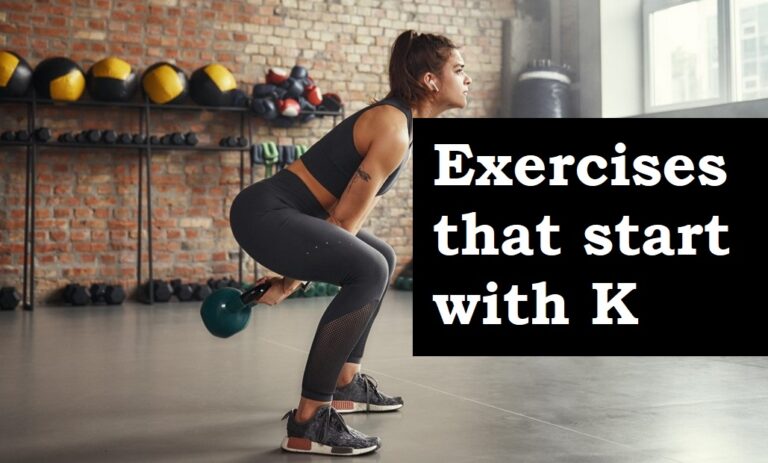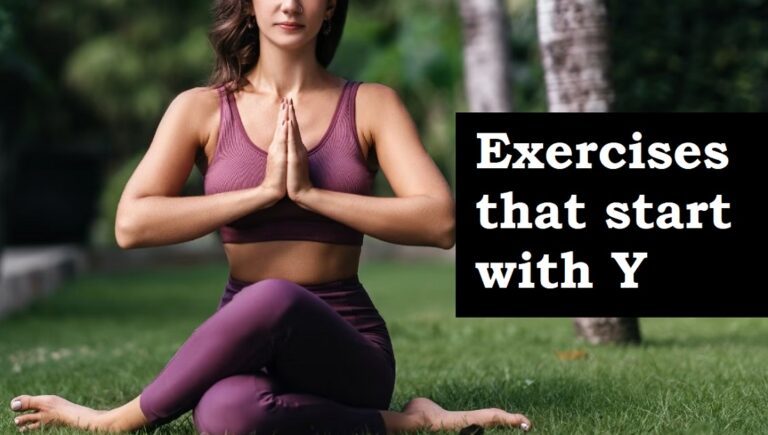10 Exercises that start with C (How to, Muscles Worked, Calorie Burn)
Maintaining an active lifestyle is essential for overall health and well-being. Incorporating regular exercise into your routine not only helps you stay fit but also improves your mood and boosts your energy levels.
If you’re looking for a diverse set of exercises that start with the letter “C” to add to your fitness repertoire, you’re in the right place!
Now, we’ll explore ten fantastic exercises that target various muscle groups, discuss how to perform each exercise correctly, assess their intensity levels, and estimate the average calorie burn.
1. Cycling
How To: Cycling is a popular cardiovascular exercise that can be done outdoors on a bicycle or indoors on a stationary bike.
To start, adjust the bike seat height to a comfortable level, place your hands on the handlebars, and begin pedaling in a controlled motion. Maintain a steady pace for the desired duration of your workout.
Intensity Level: Cycling intensity can be easily adjusted by altering your speed or resistance settings. Beginners can start with a moderate pace and gradually increase their intensity as they build stamina.
Muscles Worked: Cycling primarily targets the quadriceps, hamstrings, calves, and gluteal muscles. Additionally, it engages the core for stability.
Average Calorie Burn: On average, a 30-minute moderate-intensity cycling session can burn approximately 200 to 300 calories.
2. Crunches
How To: Crunches are excellent for targeting the abdominal muscles. Lie on your back with your knees bent and feet flat on the floor.
Place your hands behind your head or across your chest. Lift your shoulders off the floor using your abdominal muscles, and then slowly lower yourself back down.
Intensity Level: Beginners can start with a set of 10 to 15 repetitions and gradually increase the number of reps as they get stronger.
Muscles Worked: Crunches primarily target the rectus abdominis (six-pack muscles) and also engage the obliques.
Average Calorie Burn: A 15-minute session of crunches can burn approximately 80 to 100 calories.
3. Circuit Training
How To: Circuit training involves performing a series of exercises in a specific sequence with minimal rest in between. You can create your own circuit or follow a pre-designed one.
Choose a set of exercises that target different muscle groups and perform them one after the other.
Intensity Level: The intensity of circuit training can be customized based on the exercises chosen, the number of repetitions, and the time allocated for each exercise.
Muscles Worked: Circuit training engages multiple muscle groups, providing a full-body workout.
Average Calorie Burn: The calorie burn during circuit training can vary significantly depending on the exercises and intensity. On average, a 30-minute session can burn around 300 to 500 calories.
4. Climbing (Stairs or Rock Climbing)
How To: Climbing can be done on stairs or, for a more adventurous option, on a rock climbing wall. If you’re using stairs, simply walk or run up and down. For rock climbing, follow proper safety protocols and use the correct equipment.
Intensity Level: Climbing stairs can be adjusted by varying your speed and the number of flights climbed. Rock climbing intensity can be adapted by choosing different routes or increasing the difficulty level.
Muscles Worked: Climbing targets the quadriceps, hamstrings, glutes, calves, and also engages the core and upper body muscles in the case of rock climbing.
Average Calorie Burn: A 30-minute session of stair climbing can burn approximately 200 to 250 calories, while rock climbing can burn around 400 to 500 calories.
5. Calf Raises
How To: Calf raises are simple but effective exercises for strengthening the calf muscles. Stand with your feet hip-width apart, rise onto the balls of your feet, and then slowly lower your heels back down.
Intensity Level: Beginners can start with a set of 15 to 20 repetitions and increase the number of reps as they progress.
Muscles Worked: Calf raises target the gastrocnemius and soleus muscles of the calves.
Average Calorie Burn: A 15-minute session of calf raises can burn approximately 50 to 70 calories.
6. Chest Press
How To: The chest press is a classic exercise that works the chest muscles. Lie on a flat bench or use a chest press machine.
Hold dumbbells or a barbell at chest level, and push them away from your body until your arms are fully extended. Then, slowly lower the weights back down to the starting position.
Intensity Level: Beginners should start with a weight that allows them to perform 8 to 12 repetitions with proper form.
Muscles Worked: The chest press primarily targets the pectoral muscles, with secondary engagement of the triceps and shoulders.
Average Calorie Burn: A 30-minute chest press session can burn approximately 150 to 200 calories.
7. Cobra Stretch
How To: The cobra stretch is an essential yoga pose that helps improve back flexibility and strengthen the lower back muscles.
Lie on your stomach, place your palms on the floor beside your chest, and gently lift your upper body off the ground, keeping your pelvis and legs in contact with the floor.
Intensity Level: The intensity can be controlled by adjusting the height to which you lift your upper body off the ground.
Muscles Worked: The cobra stretch targets the erector spinae muscles in the lower back.
Average Calorie Burn: The cobra stretch is a gentle stretching exercise and may not contribute significantly to calorie burn.
8. CrossFit Exercises (e.g., Clean and Jerk)
How To: CrossFit exercises, such as the clean and jerk, are dynamic and challenging movements that involve lifting a weighted barbell from the ground to shoulder height and then pushing it overhead in one fluid motion.
These exercises require proper form and technique, so beginners should seek guidance from a qualified trainer.
Intensity Level: CrossFit exercises are high-intensity and should be approached with caution. Beginners should start with light weights and focus on mastering the technique before increasing intensity.
Muscles Worked: The clean and jerk primarily target the legs, hips, shoulders, and core.
Average Calorie Burn: A 30-minute CrossFit session can burn approximately 300 to 500 calories, depending on the exercises and intensity.
9. Crab Walk
How To: The crab walk is a bodyweight exercise that targets the upper body, core, and glutes. Sit on the floor with your knees bent and feet flat on the ground.
Place your hands behind your hips, fingers pointing backward. Lift your hips off the ground and start “walking” backward or forward, maintaining the crab position.
Intensity Level: Beginners can start with a few steps and gradually increase the distance covered.
Muscles Worked: The crab walk targets the triceps, deltoids, core muscles, and glutes.
Average Calorie Burn: A 15-minute session of crab walks can burn approximately 70 to 100 calories.
10. Chin-Ups
How To: Chin-ups are excellent for strengthening the upper body, particularly the back and arms. Find a sturdy horizontal bar at a height that allows you to hang freely with your arms fully extended.
Palms should face toward you (underhand grip). Pull your body up until your chin clears the bar, and then slowly lower yourself back down.
Intensity Level: Beginners can start with assisted chin-ups or negative chin-ups (lowering phase only) until they build enough strength to perform full chin-ups.
Muscles Worked: Chin-ups primarily target the latissimus dorsi (lats), biceps, and upper back muscles.
Average Calorie Burn: A 15-minute session of chin-ups can burn approximately 100 to 150 calories.
Conclusion
Incorporating a variety of exercises that start with the letter “C” into your fitness routine can make your workouts more engaging and effective. From cardio to strength training and flexibility exercises, these ten workouts cover a wide range of muscle groups and fitness goals.
Remember to start with a warm-up before each session and consult with a healthcare professional or fitness expert if you have any health concerns or specific fitness objectives.
With dedication and consistency, these exercises will contribute to improved strength, flexibility, and overall well-being. Happy exercising!







